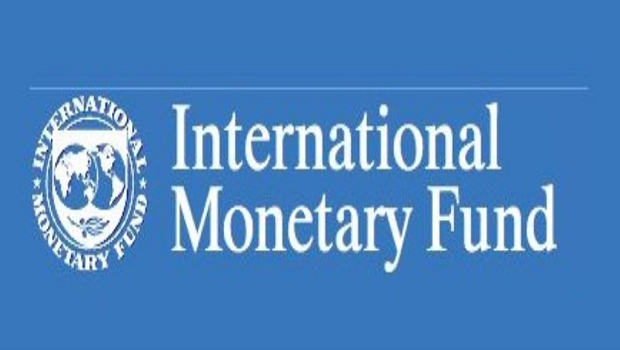E-Financial
Nigeria’s Fiscal Woes to get Worst- IMF

International Monetary Fund (IMF) has again raised concern about the rising Federal Government fiscal deficit, warning it could hit 6.1 per cent of the nation’s Gross Domestic Product (GDP) as oil production remains weak.

This was contained in the latest Staff Article Consultation report released in Washington on Wednesday after a discussion on recent economic and financial developments and the economic outlook for the country between the IMF staff team led by Jesmin Rahman and the Nigerian authorities at their meetings between June 6-10, 2022.
The new fiscal deficit projection by the IMF is 2 per cent over the N7.35 trillion of Nigeria’s fiscal deficit in the amended N17.3 trillion 2022 budget which represents 3.99 per cent of the country’s GDP.
Latest data from the Organization of the Petroleum Exporting Countries (OPEC) shows Nigeria lost its status as Africa’s largest producer of oil due to production dropping by 195,000 barrels per day (bpd) to 1.02 million BPD in May 2022.
Nigeria’s massive oil drop, owing to theft, vandalism and others came at a time oil price was trading above $100 per barrel and other major producers were reaping billions of dollars.
The development is the worst of the year, denying the country of largesse at a time Europe is shopping for alternatives to fill the vacuum created by the drop in Russia’s output owing to the sanctions over the invasion of Ukraine
These challenges and the escalating food prices and security, the IMF noted that the Nigerian economy outlook is very challenging.
It said: “The economic outlook is challenging with the high food prices raising food security concerns.”
However, the IMF noted that Real GDP growth was broadening to all sectors except oil, while inflation remains elevated.
The IMF staff team led by Jesmin Rahman held meetings with the Nigerian authorities from June 6-10, 2022, to discuss recent economic and financial developments and the economic outlook for the country.
The report of the team led by Rahman states that “Economic recovery continues to gain strength on the back of services and agriculture with GDP growth reaching 3.6 per cent (y/y) in Q1 2022.
At least data shows economic growth broadening to all sectors except oil, where production remains weak reflecting continued security and technical challenges.
“Inflation has reached 17.71 per cent (y/y) in May led by a renewed surge in food prices, exacerbated by the war in Ukraine, and raising food security concerns as over 40 per cent of the population live below the poverty line.
To contain inflationary pressures, the Central Bank of Nigeria has recently hiked its monetary policy rate by 150 basis points to 13 per cent.
Regarding the external sector, Rahman noted that the current account deficit narrowed significantly in 2021 helped by import compression and a higher net oil balance.
However, she added that the improving trade balance, which had continued so far in 2022, was having a limited impact on Foreign Exchange (FX) strains with the exchange rate premiums in the parallel market staying in the 35-40 per cent range since
She noted: “Despite supportive oil prices, gross FX reserves fell to $38.6 billion at end-May 2022, having reached $41.5 billion in September 2021 boosted by SDR allocation and Eurobond issuance. Regarding the economic outlook, GDP growth is projected at 3.4 per cent (y/y) in 2022 while inflation is expected to remain elevated.
“The fiscal deficit of the Consolidated Government is expected to remain high at 6.1 per cent of GDP due in great measure to costly petrol subsidies and limited tax revenue collections.
” Downside risks to the near-term arise from further deterioration of security conditions, elections, low vaccination against Covid-19 and higher global interest rates.”
E-Financial
SEC Tasks Registrars, Other CMOs on Innovations

The Securities & Exchange Commission (SEC) has challenged registrars and other Capital Market Operators (CMOs) to drive innovations and explore new opportunities in unlocking current changes in the global market.

This was stated by Dr. Emomotimi Agama, Director-General, SEC, at the Institute of Capital Market Registrars (ICMR) 14th Annual Conference & Presidential Investiture during the weekend in Lagos.
The theme of the 2025 conference was, “Unlocking Global Value: The evolving market role of capital market registrars in trust, efficiency and innovation.”
Agama who was represented by executive commissioner (Operations), SEC, Mr. Bola Ajomale, charged registrars to remain innovative and proactive, warning that unregulated players could take over their functions if the profession fails to evolve.
In a goodwill message, the Group chairman of NGX Group, Alhaji (Dr.) Umaru Kwairanga, described registrars as ‘the quiet custodians of confidence and credibility’ whose accuracy and efficiency underpin investor trust and corporate governance.
Group Vice President of Dangote Industries Limited, Mr. Olakunle Alake, who delivered a keynote address, outlined three imperatives for the registrar profession.
“Digitization and cybersecurity: embrace digital platforms, but with robust safeguards to protect data integrity. Capacity building and training: continuous education must be non-negotiable. The world is changing too fast for outdated skills. Global benchmarking: aim not just to meet local standards, but to benchmark against global best practices,” he said.
Founder and vice chairman of Emerging Africa Group, Dr. Toyin Sanni, urged registrars to reposition themselves as trusted, tech-enabled partners in the investment value chain.
E-Financial
IFC Unveils $310M Investments to Support Smaller Businesses and Advance Job Creation

IFC has announced investments totaling $310 million in projects that will support the growth of smaller businesses and job creation across several African countries. The projects were announced at the Africa Financial Summit (AFIS), which convened private and public sector representatives from across Africa under the theme of mobilizing domestic capital at scale for development.

The two-day event, co-hosted by IFC, the Jeune Afrique Media Group, and the Kingdom of Morocco, featured discussions among African central bank governors, regulators, financial institutions, and fintech innovators on how Africa can best tap its own resources—and attract more foreign investment—to shape the continent’s financial future, create jobs, and sustainably grow its economies.
On the sidelines of AFIS, IFC announced partnerships with several financial institutions that will channel funds and support towards businesses in Egypt, Ethiopia, and Morocco, helping businesses grow and reach new markets.
The new projects IFC announced are:
- A $50 million financing package to Suez Canal Bank will expand lending to smaller businesses across Egypt, particularly in underserved regions. A quarter of the loan is earmarked for women-owned businesses to help bridge the gender financing gap and boost inclusive growth.
- A $10 million equivalent IFC local-currency risk-sharing facility with Attijariwafa Bank Egypt to expand access to finance for smaller businesses and support job creation. At least a quarter of the loans are earmarked for women-owned businesses, and half to SMEs in vulnerable communities. The initiative is supported by the Prospects Partnership, which supports development for host communities and forcibly displaced people.
- A $250 million IFC risk-sharing facility with newly established Saham Bank will strengthen Morocco’s financial stability and expand access to finance for local businesses. IFC will share up to 50 percent of the credit risk on the bank’s $500 million corporate loan portfolio, helping sustain lending to key sectors. Saham Bank recently acquired Société Générale Marocaine de Banques.
- An IFC advisory services support program for VisionFund to help the microfinancier expand lending to smaller businesses and deepen financial inclusion in Ethiopia. The project will strengthen VisionFund’s capacity in strategic business planning, risk management, and responsible finance, enabling it to reach more underserved entrepreneurs—especially women. This initiative follows IFC’s recent $10 million local currency loan to VisionFund.
Ethiopis Tafara, IFC’s Vice President for Africa, said, “The combination of Africa’s own financial resources with strategic international capital is a potent recipe for growth on the continent. Africa’s entrepreneurs are building companies that rival any in the world—and with the right support, they can grow and create the jobs and opportunities Africa needs. These projects underscore the power of partnerships as well as the important role of events like AFIS in bringing together like-minded organizations for development and impact.”
AFIS was established in 2021 to promote a shared understanding among public authorities and private sector leaders of the trends and risks shaping the continent’s financial industry. Through open dialogue and collaboration, AFIS helps identify opportunities for improvement, whether through regulatory reforms or market-driven initiatives.
This year’s event brought together more than 1,250 senior leaders from Africa’s financial sector—including those who manage Africa’s savings with those who can channel international investment—with the aim of delivering more funds to job-creating African businesses and projects.
Over the past two decades, IFC has collaborated with more than 300 financial institutions across 40 African countries to enhance banking systems, expand access to finance, and mobilize private capital. This partnership has helped build the foundations for opportunity—fueling enterprise, enabling jobs, and driving the continent’s next generation of growth.
E-Financial
Court Jails Asiegbu, Former Wema Bank’s Manager 3 Years for N8Bn Fraud

Justice Rahman Oshodi of the Lagos State Special Offences Court in Ikeja on Wednesday, convicted and sentenced Samuel Asiegbu, former financial and retail product manager with Wema Bank Nigeria Plc, to three years in prison for hacking and stealing N8.56 billion from the bank vault.

Justice Oshodi jailed Asiegbu, without the option of a fine, after pleading guilty to the eight-count charge of conspiracy, fraud and unauthorised access to a computer system.
The convict was accused by the Economic and Financial Crimes Commission (EFCC) alongside Hamza Zakaria, Nurudeen Ibrahim and Alhaji Sulaiman of manipulating the bank’s internal systems in January 2025 to cause a financial loss of over N8.5 billion.
The anti-graft agency informed the court on June 23, 2025, when the defendants were first arraigned, that the offences violate Sections 409 and 386 of the Criminal Law of Lagos State, 2011.
All the defendants had initially pleaded not guilty to the charge.
However, Asiegbu later changed his plea to guilty, leading to his conviction and sentencing.
Justice Oshodi sentenced the convict to 10 months and 8 days in prison for count three and 1 year and 8 months for count four, both sentences are to run concurrently and without an option of a fine.
The court subsequently struck out counts one and two.
The judge has fixed November 14 for the commencement of the trial of the remaining defendants.

 E-Financial2 days ago
E-Financial2 days agoZachXBT, Crypto Investigator Lists Nigeria, Others as Worst Jurisdictions for Scam Victims

 Telecom2 days ago
Telecom2 days agoFUNAAB 500-Level Student Wins 5th Brand New Car at MTN Pulse Campus Invasion

 Telecom2 days ago
Telecom2 days agoEricsson, MTN Nigeria Boost Network With New Tech

 Telecom2 days ago
Telecom2 days agoLagos to Launch Automated Telecom Permit System by 2026

 News2 days ago
News2 days agoFG Taps John Nwabueze as First Tax Ombudsman

 E-Business2 days ago
E-Business2 days agoReport Reveals DLL Hijacking Attacks have Doubled since 2023

 Telecom2 days ago
Telecom2 days agoGlo Unveils New “Glo Collabo Bundles,” Offers More Value for Less

 E-Financial2 days ago
E-Financial2 days agoFirms Eye Fintech Model for Insurance



























